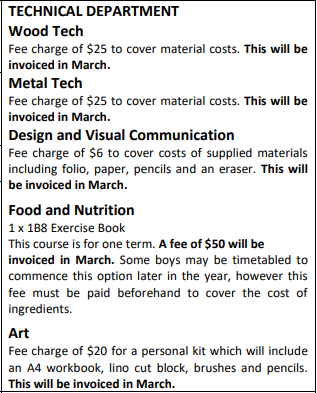The end of January marks the beginning of the school year for students and teachers across the country, and some parents will be reeling at the cost of sending their children off to get a free state funded education.
Despite state schools receiving government funding and rules preventing parents from being charged fees, the costs associated with getting the kids through high school are significant. Bills for uniforms, travel to and from school, stationary, sports, and extracurricular activities. Increasingly parents are expected to stump up for laptops where the school has a Bring Your Own Device (BYOD) policy.
Add to that, money is frequently requested for activities which are part of the school day but don’t strictly fall under core curriculum: a visiting performance, mufti days, trips, cupcakes for animal welfare, and the real biggie - camp.
Unbelievably, sitting NCEA incurs an NZQA exam fee of $76.70, there is a financial hardship scheme if you can negotiate their process and apply on time.
On top of everything listed so far, most schools ask for an annual donation. Schools argue that donations provide much needed top up to the operations budget. They cannot require parents to pay this, but some schools are innovative in their attempts to extract the money. Tactics include withhold the annual yearbook, withholding reports (illegal), and some even use public shaming by publishing a “Thank you” list of all the families who did pay up.
The costs add up, and when looked through a lens of low wages and high rates of child poverty the concern is clear.
| Item | Low | High |
|---|---|---|
| Shoes | $80 | $140 |
| School fees/donations | $100 | $350 |
| Participation in extra-curricular programmes | $50 | $1,000 |
| Stationery list | $90 | $200 |
| Equipment, materials fees for workshop technology | $0 | $500 |
| Travel to and from school | $0 | $1,000 |
| Subject Costs | $0 | $500 |
| Annual Cost Years 10-13 | $320 | $3,690 |
| Uniform (Junior minimum required) | $200 | $800 |
| Total for first year of high school | $520 | $4,490 |
| Additional costs not included above | ||
| Computer/Device | $350 | $1200 |
| Field trips/Camp (each) | $300 | $1,000 |
| NCEA fees (applicable in years 11, 12 and 13)* | $20 | $77 |
| Scholarship exam fees (fee per subject) | $30 | $30 |
| Total for 5 years of high school | $1,800 | $19,250 |
So how much does a free education really cost? A sample of New Zealand state schools shows a wide variation in the costs of required uniform and equipment. As you’d expect those with higher decile ratings have higher associated costs. Allowing for a range of options (some kids can walk to school, others may prefer more expensive shoes) we can get an idea of the costs facing parents.
Year 9 is where it hurts the most, with the transition to high school comes the uniform cost.
Schools which require monogrammed blazers and kilts have uniforms which can cost two or three times more than schools which use generic items. Many schools have different or additional uniform items for senior students delivering an extra financial hit in year 11 if the uniform isn’t too small or worn out by this stage.
Also, the trend to charge fees for the materials used in teaching core curriculum subjects might limit the subject choices for the children of low income families.

Example of subject fees (Source: Otago Boys High School)
Beyond the monetary figures there are deeper hidden costs. Embarrassment at being unable to pay, and therefore unable to participate in those parts of school which keep kids engaged and enjoying their education. Kawerau's truancy service recently called for schools to stop asking parents for money as that town faces yet another year of the lowest attendance rates in the country. They argue that costs are contributing the issue of school truancy in that community, and this is likely to be playing out for low income families across the country.